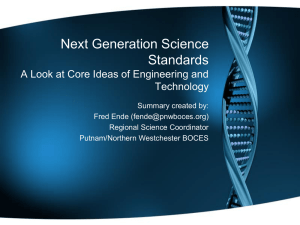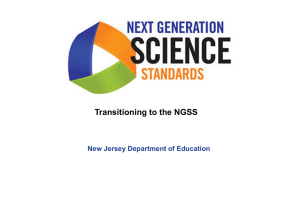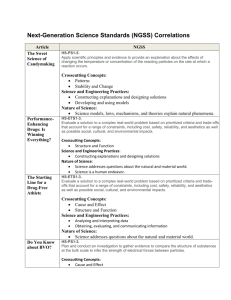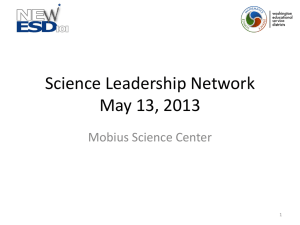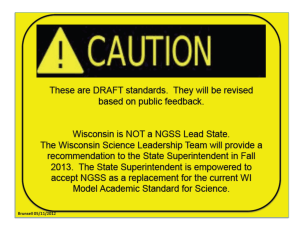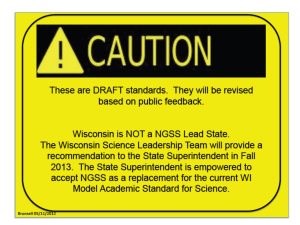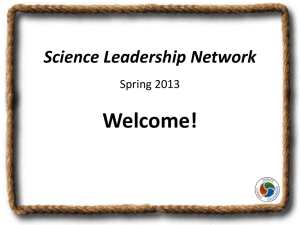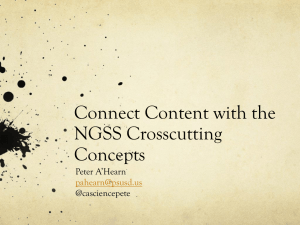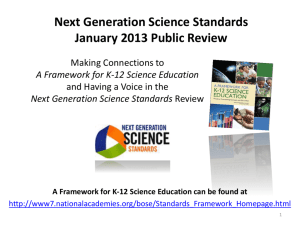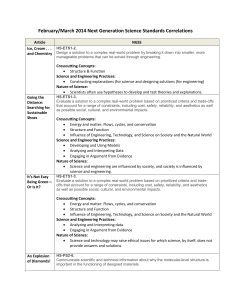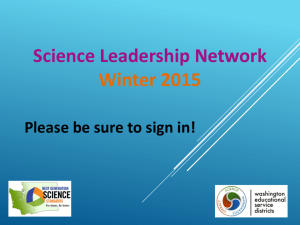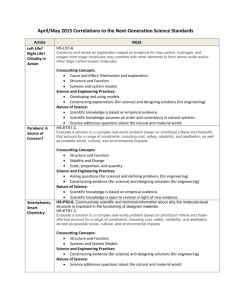Presentation - Council of State Science Supervisors
advertisement
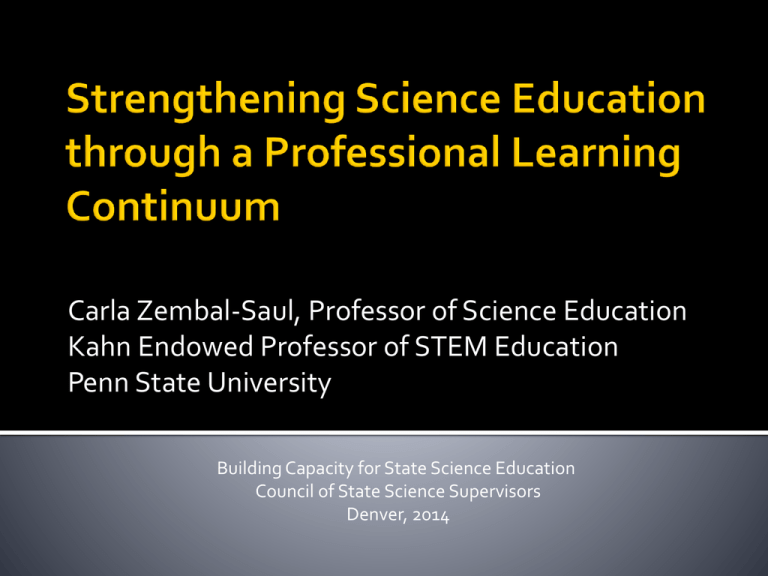
Carla Zembal-Saul, Professor of Science Education Kahn Endowed Professor of STEM Education Penn State University Building Capacity for State Science Education Council of State Science Supervisors Denver, 2014 • • Board on Science Education (BOSE) and NRC’s Teacher Advisory Council Committee charge • Identify teachers’ learning needs and current opportunities for learning • Develop guidance for providing opportunities to support teachers’ learning • Funded by the Merck Corporation Foundation See the website for more information http://sites.nationalacademies.org/DBASSE/BO SE/CurrentProjects/ Coming soon! Expert review in Summer 2014 Anticipated release in Fall 2014 K-6 teacher learning and development for engaging students in scientific discourse and practices Across career stages Commitment to school–university partnerships Affordances of technology Science learning Learning to teach science Revisit next generation science education What do we know? What are we working on? What are the persistent questions? Questions and conversation Career stage – preservice, induction, career System level – elementary, middle, high school Level Levers Limits Elementary School Understanding of children and development Opportunities to integrate across subject area Limited knowledge of science content and practices Generalists Frequent grade level changes Middle School Focus of much attention and funding Ambitious content Preparation varies greatly (K-6, 7-12, other) High School More depth of content knowledge Often assigned to teach outside of discipline Verification labs v. practices Developmental process Dynamic Context dependent Responsive to problems of practice Attentive to equity and ethics Continuum as essential expertise that teachers and groups of teachers develop across careers to meet the demands of the new vision New vision for science education revisited Gap with current practices Demands of new vision Articulated in the Framework and NGSS Based on decades of research about how people learn Expressed as learning performances that weave together practices and crosscutting concepts in the context of content (DCIs) Coherent building of ideas over time Integrated across Mathematics and ELA Gap between vision and current instruction, curriculum, and assessment Teachers are responsible for creating learning experiences for their students However, it is likely that teachers… Have not experienced this kind of science learning Have not been prepared to teach in ways that reflect the new vision (SM and PCK) Teach in districts that focus on and support subjects other than science Integration of core ideas, practices and crosscutting concepts Skillful teaching and assessment practices, with emphasis on classroom discourse Technology tools aligned with scientific and engineering practices Support for a range of diverse learners Teachers, schools and districts will need considerable support moving forward True for ALL (or at least most) Novice and experienced teachers Teachers at all levels of the system, K-12 Schools/districts where science has been neglected and those known for their excellent science programs Teacher educators and professional development providers Science teaching workforce Opportunities for teachers to learn Characterized by substantial variability Background and preparation Professional learning opportunities Contexts in which they work Available data on workforce Fragmented across surveys Difficult to track for elementary teachers 2012 National Survey of Science and Mathematics Education SASS 2007-08 (NCES Schools and Staffing Survey) Commissioned reports – administrative databases in Florida and New York Science background – no science cert 40% of middle level science teachers 14% high school science teachers Science teaching career 40% middle school and ~50% high school science teachers have >10 years experience More than half of new science teachers leave before 5th year National trend toward inexperience and undeveloped expertise Uneven distribution of knowledgeable and experienced teachers Teachers without science degrees more common in high poverty schools Greater numbers of less experienced science teachers found in higher poverty schools Focus on new science knowledge and teaching practices Over time, range of dimensions, various contexts, uneven supports and constraints Profound role of context Other influences High stakes testing Rapidly changing demographics Nature of workforce Driven by individual interest v. building capacity at the school or district level Episodic and lack coherence No intentional relationship between opportunities Not informed by articulated theory of learning Shared vision for science teaching Features of effective PLOs Far less clear than vision of learning Pockets of innovation Core sets of instructional practices needed Practitioners and researchers implement and study over time Instructional practices that have a positive influence on students’ science learning High leverage practices (Ball and colleagues) Ambitious teaching (Windschitl and Calabrese- Barton) Categories of characteristics across studies Ways teachers frame students’ intellectual work Use of conceptual anchors for collective work How teachers mediate student reasoning and activity Consensus view emerging Based on research across multiple subject areas Empirical evidence for features is limited and mixed “Connect the dots” studies rare Useful as a starting point for providers and researchers Active engagement with time for interactions with peers Analysis of teaching practices and samples of student work Attention to content intertwined with pedagogy Connected to curriculum Coherent with school policies and practice Sustained over time Integrate three dimensions of NGSS – disciplinary ideas, practices, crosscutting concepts Engage with scientific and engineering practices Attend to meaningful assessment practices Experience ≠ expertise. What counts as expertise, where does it reside, and how do we harness it? Context is king. How do we leverage it as an asset while remaining sensitive to it? Who should provide teacher learning opportunities and what are the appropriate qualifications/expertise? How do we leverage the affordances of technology to support teacher learning? How do we build capacity within and across systems and across career stages? Cannot ignore teacher learning Complex and nuanced problem made more challenging by new vision Constellation of supports All levels of system and across career spans Coherent and aligned with vision Networks of expertise Focus on capacity building Sensitive to context
